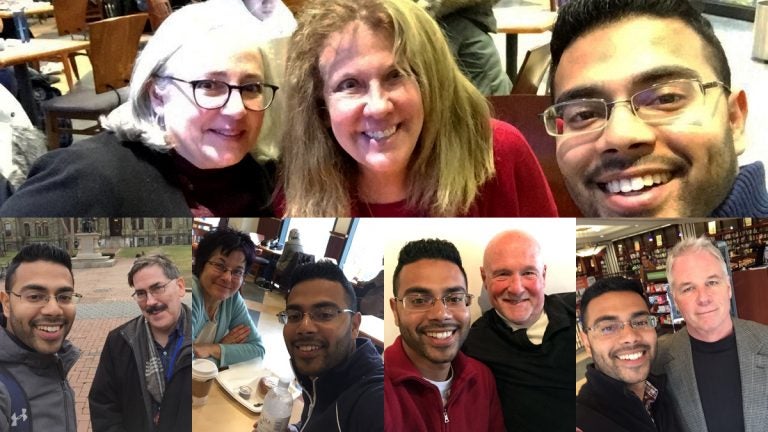7 common questions from my coffee conversations about Islam
In a series of conversations about Islam that I have been having with people from all across Pennsylvania, seven questions come up most often.

The author is shown posing with several of the people who met him for conversations about Islam over coffee. (Images courtesy of Akbar Hossain)
In a series of conversations about Islam that I have been having with people from all across Pennsylvania, seven questions in particular come up most frequently.
In a commentary I wrote for the Philadelphia Inquirer in December, condemning hate crimes against Muslims, I offered to have coffee with anyone who wanted to learn about Islam or just meet a Muslim in person. I received hundreds of responses and have been working my way through those requests.
My purpose in hosting these coffee dates is not to convert, nor to preach Islam, but rather to help clarify misconceptions about my religion.
It is important to note that I am not an Islamic scholar. In these — or any conversations — I do not speak on behalf of all Muslims. The answers I lay out here are based on my limited understanding of Islam through the eyes of a Muslim who grew up in the United States. There are volumes of writings on each of the topics I address below. I am merely scratching the surface of what are incredibly fascinating and thought-provoking questions.
Here they are, along with my best answers.
1. ‘Why is Islam so violent?’
I am not convinced that the premise of this question is legitimate. While the media certainly sensationalizes terrible attacks by Muslims, no demonstrable data shows Muslims are more violent than any other religious group.
Military forces of various non-Muslim countries kill vastly more people than “Muslim terrorists.” While this does not excuse attacks by people who call themselves Muslims, context and framing matter. Violent crimes committed by Muslims (or those who appear to be so) are invariably presumed to be acts of terror, while substantially similar acts committed by all others are not treated as such. This has inflated the perceived terrorist proclivities of “Muslims.”
When it comes to the actual teachings of the Quran, Islam explicitly forbids the use of violence to promote or further Islam (Chapter 5, Verse 53). The prophetic tradition, the source of much of practiced Islam, reveals that violence and war are only to be invoked as last resort. Prophet Muhammad’s ultimate conquering of Mecca, following his persecution and exile from his home, was completed without any bloodshed. Diplomacy and the negotiation of the Treaty of Hudaibiya led to this major victory. This is the example that majority of Muslims around the world follow everyday. The example teaches — and Islam preaches — that in antagonistic, adverse circumstances, we must resort to diplomacy, negotiation, and co-existence.
2. ‘What do Muslims really believe in?’
I often get this question from people who are curious about the tenets of Islam. One important fact many people don’t know is that Muslims believe in the same monotheistic God as the Jews and Christians. “Allah” is only the Arabic word for “God,” not a separate deity. With so much fake news available at people’s fingertips, it is important to clarify that Muslims have various beliefs,depending on sect, culture, and level of observance.
However, there are five central practices in Islam that are mandatory for every Muslim to perform. They are known as the Five Pillars:
- Shahadah, or “faith,” declaring there is no god, but God, and Muhammad is his messenger
- Salat, or “prayer,” five times a day
- Zakat, or “charity,” giving a portion — usually 2.5 percent — of one’s savings to charity
- Swam, or “fasting,” during the month of Ramadan
- Hajj, or “pilgrimage,” to the holy city of Mecca once during one’s lifetime, if one has the means
3. ‘What is the difference between Sunni and Shia?’
While both of these sects encompass a wide set of doctrines, at the core, the majority of Sunni and Shia Muslims share the same beliefs in the five pillars, oneness of God, and the teachings of the Prophet Muhammad.
It is my understanding that the main division originates from the question of succession in leadership following the death of Prophet Muhammad. Shias believe that only descendants of the prophet should have led the Muslim community, whereas Sunnis believe that the Muslim community is free to choose a leader. After the death of Prophet Muhammad, many people disagreed with the choice of Abu Bakr, one of the prophet’s closest companions, being granted a leadership position. These people wanted Ali, the prophet’s cousin, to take leadership (which he did after Abu Bakr’s two successors were assassinated). Today, more than 80 percent of the world’s 1.6 billion Muslims are adherents of the Sunni sect of Islam. Iran and Iraq have the largest numbers of Shia Muslims.
4. ‘What’s up with the head cover for women?’
I am of the opinion that no man is qualified to speak about a woman’s hijab, or head scarf. I also think there’s an underlying question about equality between men and women in Islam embedded within this question. Islam requires modesty of both men and women.
Contrary to popular belief, women are not required to wear the hijab — it is a matter of free choice. My mother and some of my Muslim friends wear one, while my sister and some of my other friends do not. However, in certain parts of the world, tradition and culture have been infused with religion and, combined with the patriarchal nature of some societies, it may seem like a religious requirement.
Conversely, some Muslim women are forbidden from dressing “modestly” and wearing a hijab in many Muslim-majority countries (e.g., Egypt, Lebanon, and Morocco), because it is inelegant or does not fit the contours of Western thought.
The verdict on the hijab is still out, Some women will tell you it’s a sign of independence; others will say it is a sign of their “modesty;” and some reject the entire notion of wearing a hijab. Any “rules” about head coverings are ingrained in tradition and culture, not religion. It is also important to note that the perspective being considered is often tainted with a westernized cultural understanding, which is frequently the premise under which this question is asked.
5. ‘I don’t have anything against Muslims, but I don’t want sharia law in the United States.’
Sharia is not coming to the United States. This is one of the biggest misconceptions I find myself correcting. People are afraid of “sharia law” without a firm understanding of what it entails. Nine states have passed anti-sharia statutes, and politicians across the United States have vowed to protect America from the evils of sharia.
Let’s be clear, sharia is not Islamic law, nor is it a type of “law” as we understand it in the Western world. Professor Asifa Quraishi-Landes of the University of Wisconsin School of Law expressed my sentiment best: Muslims who follow sharia do not think of it as a substitute for civil law. In fact, a central tenet of sharia is that Islam requires Muslims to follow the rules of the country in which they live.
Sharia is not a book of statutes or judicial precedent imposed by a government, and it’s not a set of regulations adjudicated in court. Rather, it is a body of Quran-based guidance that points Muslims toward living a life that brings them close to God. It does not come from the state, and it does not even come in one book or a single collection of rules. Muslims are not looking to force anyone to follow sharia. In fact, one of the central ideas of sharia is that Islam cannot be forced on anyone (Chapter 2, Verse 256).
6. ‘Why don’t Muslims condemn terrorism?’
But we do. Muslims consistently denounce terrorism both personally and through structural institutions like the Council on American-Islamic Relations (CAIR), Muslim Public Affairs Council (MPAC), and statements from various mosques. Whether these denouncements are appropriately highlighted in the mass media or sought out by those who need them for their personal satisfaction is a different story.
However, my issue with this question is the obsessive expectation to hear Muslims condemn terrorist attacks. No other religious group faces the same expectation to speak out against every single terrible act committed by a random person in the name of that religion. It is an unreasonable and absurd standard.
7. ‘What can I do to help?’
Reach out — needs vary by location and community. Call or go in person to your local mosque and ask how you can help. Sometimes your very presence in a mosque is a strong statement of solidarity that a community needs in a time of uncertainty and hatred.
Learn and teach, expand your horizon. I hope this article is a good start. There are incredible translations of the Quran available online and in print. Read, engage, and then encourage your children and your relatives to learn with you. Correct misconceptions when you hear them.
Support. This can be physical, emotional, or financial. Donate to organizations fighting for Muslim rights like the ACLU, CAIR, and MPAC. Spend your money at local Muslim restaurants and businesses. Speak up when you hear or see injustice.
WHYY is your source for fact-based, in-depth journalism and information. As a nonprofit organization, we rely on financial support from readers like you. Please give today.





